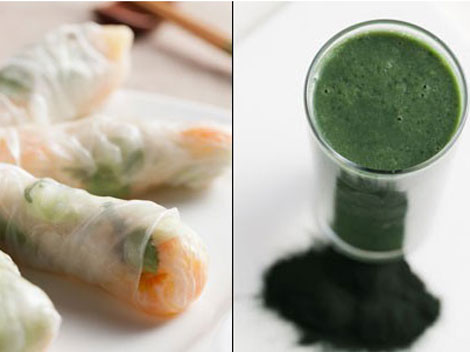Posted 2017/8/10

Meats of all varieties in winter are usually top of these extra-rich festive menus. So how about sampling some vegetarian fare this holiday season? There are a number of dining options in Shanghai, all of which offer healthy and tasty food.
Kush
In Sanskrit, the word "kush" means "mercy" and "benevolence," which chimes well with this Yanping Road eatery's environmental-friendly, vegetarian concept. Next door to Japanese restaurant Sushi Abuse, Kush is located in the downtown 98 Innovation Zone in Jing'an district. Labeling itself as Shanghai's first "international" vegetarian restaurant, the eatery offers a menu of Western dishes from starters to entrees and desserts, with English-language menu and service. With only four tables, the tiny area is decked out in shades of dark green, that helps create a natural and warm atmosphere.
Fresh spring rolls are wrapped in semi-transparent skin made from rice and containing sliced cucumber, carrot, tofu, rice noodles and basil. A small plate of specially prepared sauce goes along with the rolls, adding some sweet-and-sour flavor to the dish. The lentil burger is another must-try. The smashed lentils are mixed with corn niblets and broccoli, and laid over a basil sauce, giving meat-lovers some consolation - if only for the texture. The meal is served with crisp slices of bread. Green Goddess is the restaurant's signature smoothie, and includes the juice of various vegetables and fruits such as spinach, banana, celery, parsley, avocado, all mixed with soy milk, nut milk, or coconut juice. The restaurant also provides various kinds of salads and wraps, as well as a delivery service so that you can "go veggie" in your own home.
New Age Veggie
The Buddhist sentences and phrases emblazoned across the entrance to this restaurant reveal the concept of vegetarianism as an important religious belief. Many of the meals here resemble the flavor and taste of regular meat dishes. The kitchen uses "mock-meat" ingredients such as tofu and different kinds of fungi. For example, hedgehog mushroom is used to imitate chicken meat because of its similar texture, and "fish" dishes are cooked with tofu skins, sea sedge and fungi. It is also surprising to see "sashimi" on the menu. It is, in fact prepared with konjac, a type of vegetable that can pass for the raw salmon in sashimi dishes. It fools not only the eyes, but also the tongue, so similar is the taste. While the Global Times was visiting, a customer surnamed Wu, ordered a plate of hongshaorou (red braised pork) which was prepared with dried tofu standing in for lean meat and fungus standing in for the fat. "At first bite, it is really hard to tell whether it's meat or not," Wu said. "If you think of it as meat, then it really is quite similar." In order to intensify the meat flavor, the dishes are usually drenched in oily and heavy-tasting sauces that give it that "greasy" quality so peculiar to meat.
Vegetarian Lifestyle
Hidden in a side street off busy Nanjing Road West, Vegetarian Lifestyle is one of the most prestigious non-meat destinations in the city. Famous for its mock-meat dishes, Vegetarian Lifestyle's Chinese name Zaozi Shu, means "jujube tree." The eatery adopts a "non-smoking, non-alcohol, non-egg and non-meat" concept.
Evoking a nostalgic atmosphere, replete with traditional Chinese wooden tables and chairs and shikumen-styled decorations, the restaurant is popular with white-collar workers who enjoy a refreshing break from an otherwise smoky, polluted city.
Chang Xiang Si, a sausage-like dish, is one of the most popular orders at Vegetarian Lifestyle. It not only looks like sausage, with "fat" made from lotus root, but it also tastes like meat, making it ideal for the less committed of vegetarians among us.
Their delicious spinach dumplings, black pepper "steaks" and shredded "pork" in sweet sauce are also popular among local foodies.
However, after ordering such appetite-whetting dishes, you may be slightly disappointed with the rather mean portions on offer. So, if you want to have a truly memorable vegetarian experience here, we would suggest filling up on some quick dim sum before the main course.
Long-reputed Chinese vegetarian restaurants
Godly 功德林
Originally founded in Shanghai in 1922, Godly is considered the "founding father" of Chinese veggie restaurants, and is still popular today for its diverse, Huaiyang-cuisine menu. At important festivals, for example on Mid-autumn day every year, people are seen lining up outside to purchase the eatery's veggie mooncakes to take away. (445 Nanjing Road West 南京西路445号, 6327-0218. More chain shops and restaurants are dotted around the city.)
Veggie restaurant at Jade Buddha Temple 玉佛寺素斋
The restaurant is not only popular among adherents of Buddhism, but with a whole range of the city's food lovers. Apart from veggie "ham," "chicken" and "duck" that are cooked with tofu skin, other big sellers are veggie noodles and wontons. (999 Jiangning Road 江宁路999号, 6266-5596)
Wuguantang 五观堂素食
Unlike most Chinese veggie restaurants, Wuguantang refuses to cook veggie food in order that it simply resembles meat. They aim to create an original take on fresh, high-quality vegetarian cuisine. The eatery's decor is traditional and simple, somewhat akin to the mild and light taste of most of its dishes.